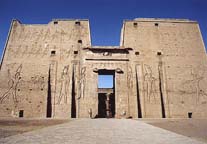|
 Galen's Kyphi Galen's Kyphi
This
recipe is from Galen (129-210 CE), Greek physician and philosopher who studied
in Egypt but lived most
of his life in Rome. Galen was the primary means through which West
Europeans learned about the medicine of Hippocrates. In those days, the
incense used in ancient Egyptian temples to usher in the night had
come into medicinal use for the treatment of lung ailments and snake bites,
so physicians were important in helping to preserve the knowledge of it. In
"On Antidotes," Galen cited a recipe for kyphi that he said was recorded by
Rufus of Ephesus (110-180 CE), the physician of the Emperor Trajan. This ancient
recipe outlines the proportions for raisins, wine,
honey, asphaltum, bdellium, camel grass, sweet flag, cyperus tuber,
saffron, spikenard, aspalathos, cardamom, and cassia.
We use only natural ingredients for this kyphi; no fragrance oils or synthetics even come near it (as is true for all our oils and incenses). Some ingredients, like the saffron, are extremely expensive. The ingredients are mixed together in a high-fired ceramic bowl with a wooden spatula to preserve
their potency. Following
the ancient Egyptian custom, we add the wine-dampened, ground ingredients
one at a time in a specific order to the base of chopped raisins and honey.
 The result is a very complex combination of light sweetness, spice, and resin with dark undertones.
This is a subtle incense that is not as smokey as one
would think, considering the honey and the dried fruit, which are usually added
to give smokiness to incense and to create a way for the scents to hang in the
air. The scent is *extremely* relaxing and great for astral work; it is also
recommended for rituals conducted at night. It makes a wonderful contrast to
Dioscorides' kyphi. To our minds,
this is the more Moon of the two. The result is a very complex combination of light sweetness, spice, and resin with dark undertones.
This is a subtle incense that is not as smokey as one
would think, considering the honey and the dried fruit, which are usually added
to give smokiness to incense and to create a way for the scents to hang in the
air. The scent is *extremely* relaxing and great for astral work; it is also
recommended for rituals conducted at night. It makes a wonderful contrast to
Dioscorides' kyphi. To our minds,
this is the more Moon of the two.
Traditionally kyphi was rolled into
pills, but we have left it in a loose crumble so that you can make whatever size
pellets you want (we suggest smallish ones, no larger than a blueberry, as this
incense is volatilized slowly on account of the asphaltum). If the material
is not moist enough to stick together, add a few drops of honey and mix with
a silver or wooden spoon. Proportions will not be put out of joint by doing
this, since the recipe calls simply for "sufficient" honey. Please note that, like any synthetic-free loose incense, it requires charcoal to burn, since it is composed of pure ingredients and contains no fillers.
|
Galen's
kyphi
1 oz. in tin $21.00
Other kyphi incenses: Edfu Kyphi, Dioscorides' Kyphi
Uses in Witchcraft
& Magic:
Honoring Horus
Trancework
Divination
Consecration
Purification
© 2004-2024 Alchemy Works;
No reproduction without permission
|
 Galen's Kyphi
Galen's Kyphi The result is a very complex combination of light sweetness, spice, and resin with dark undertones.
This is a subtle incense that is not as smokey as one
would think, considering the honey and the dried fruit, which are usually added
to give smokiness to incense and to create a way for the scents to hang in the
air. The scent is *extremely* relaxing and great for astral work; it is also
recommended for rituals conducted at night. It makes a wonderful contrast to
The result is a very complex combination of light sweetness, spice, and resin with dark undertones.
This is a subtle incense that is not as smokey as one
would think, considering the honey and the dried fruit, which are usually added
to give smokiness to incense and to create a way for the scents to hang in the
air. The scent is *extremely* relaxing and great for astral work; it is also
recommended for rituals conducted at night. It makes a wonderful contrast to